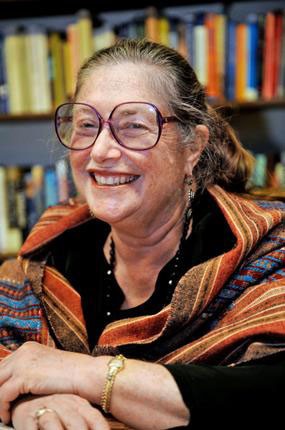Religious scholar to discuss faith, censorship at GVSU

GVL / Courtesy – The Hindu Wendy Doniger
Nov 7, 2016
The last decades have seen waves of new political and social movements through the interconnected sphere of social media. Free speech in the U.S is a right inherited generation after generation but for many, not much is understood about international ideas of free speech and what topics are or are not acceptable.
Wendy Doniger, professor of religion at the University of Chicago, will give a presentation on her personal experience of being caught in the cross-fire between religious media and its censorship. Doniger’s controversial novel, “The Hindus: An Alternative History,” was withdrawn from publication in India because it violated one of the country’s laws, which states that the deliberate offending of a person’s religious beliefs is illegal.
Doniger’s presentation will begin at noon Monday, Nov. 7 in the Mary Idema Pew Library. There will be a reception beforehand at 11:30 a.m. and there will be a book signing afterward.
Abhishek Ghosh, assistant professor of religious studies and liberal studies, was one of Doniger’s students at the University of Chicago and has been involved with the book since before its inception.
“When this book was being written, I was one of her students who had the privilege of actually reading the manuscript,” he said. “I saw it become a bestseller and saw it withdrawn in India.”
Doniger’s background is in histories of religion, a very technical field in which scholars study religion historically rather than theologically. This is a perspective of religious studies which, Ghosh said, GVSU’s religious department also exhibits.
“The Hindus: An Alternative History,” deals with themes of sex, violence, and looks at Hinduism from the margins. Ghosh said Doniger, a feminist, also reflects on women’s perspectives in the book, a choice that can create friction within religions that are patriarchal. Ghosh says although Doniger’s reading of Hinduism isn’t an orthodox one, it is important to consider and study.
Furthermore, he says it is important for Hindu and non-Hindu scholars to understand multiple perspectives and the standard as well as controversial view-points present in any religion. It is also important for people to take an ancient religion for what its traditions exhibit, rather than the headline terms that are associated with withdrawing a book from the market. Outbursts are usually brought about by some offended citizens.
“Hinduism has had a long tradition of free exchange of ideas and free speech,” Ghosh said. “That’s the nature of discourse in India.”
While there is a tradition of free exchange, some involved in the discussion believe that certain types of religious discussion such as Doniger’s should be restricted. Though this can be the case in many western religions as well.
Sarah King, associate professor in the liberal studies department, said though the U.S’s notion of free speech is the least restricted of them all, it overpowers discussions on what international free speech sounds like.
“Often, American students take for granted the idea that the American notion of freedom of speech is the only notion and that it is the way things should operate around the world,” King said.
King also relates issues of religion, politics, and censorship to an increasingly sensitive political predicament taking place in the U.S. currently.
“Because our students are Americans and we are all in the United States at this particular political moment, there’s all kinds of conversation about the place of religion in the political sphere,” King said. “It’s useful for people to hear Doniger talk about this from her own perspective.”
Doniger was brought to GVSU, in part, by the university’s relatively new religious studies program. The name “religious studies” can lead some to assume bias within the field and maybe hint at the notion that only religious practitioners can participate in such a program. Both King and Ghosh say this is anything but true.
“Our program studies human religiosity rather than teaching people how to become religious. We do not take a religious approach to the world’s religions, we take a secular approach,” Ghosh said.
Ghosh also explains since GVSU is a growing school with one of the highest enrollment rates in the state that it is important for students to be on “the global map” and experience cultural diversity. Because of this, it is crucial for international scholars of repute to visit and engage in useful conversations.






















